|

Cambridge University Digital Library
Shi zhu zhai shu hua pu
Ten Bamboo Studio collection of calligraphy and painting
1633
_______________________
"Anthropocene, Capitalocene, Chthulucene: Staying with the Trouble"
Donna Haraway
vimeo
"Sympoiesis, not autopoiesis, threads the string figure game played by Terran critters. Always many-stranded, SF is spun from science fact, speculative fabulation, science fiction, and, in French, soin de ficelles (care of/for the threads). The sciences of the mid-20th-century “new evolutionary synthesis” shaped approaches to human-induced mass extinctions and reworldings later named the Anthropocene. Rooted in units and relations, especially competitive relations, these sciences have a hard time with three key biological domains: embryology and development, symbiosis and collaborative entanglements, and the vast worlds of microbes. Approaches tuned to “multi-species becoming with” better sustain us in staying with the trouble on Terra. An emerging “new new synthesis” in trans-disciplinary biologies and arts proposes string figures tying together human and nonhuman ecologies, evolution, development, history, technology, and more. Corals, microbes, robotic and fleshly geese, artists, and scientists are the dramatis personae in this talk’s SF game."
Eco-Mapping: Multiple directions
Dee Morris & Stephen Voyce jacket2
(....)
Like the term eco-poetics, eco-mapping draws its discursive power from the oikos, whose etymological traces are manifest in both the ecological and the economic. We use it to signify a bio- rather than an anthro-pocentric approach to the complex relationships between cartography and planetary ecosystems. We agree with Donna Haraway that it is the capitalocene, and not the anthropocene, that figures the threat of mass extinction for all biotic and abiotic life. We need not return “to deep time and the end of the last ice age” to make this claim efficacious or, as Haraway argues, advance
the notion that human versus nature is as old as our species itself. Stark nonsense. But we do need to go deeper in time than the mid-eighteenth century. I use this slide [figured above] simply to signal the formations of markets and accumulations of wealth in the great trade routes, many of which figured China as a major player and the Indian Ocean as a major player. I do this simply to signal that those metabolisms of the oikos and ecos — of economy and ecology, and of worlding and of trading and making need to be figured older than the mid-18th century, and that does not mean going back to some deep ecology.” (“Staying with the Trouble”)
Hence we begin with two assertions: first, the human is one element in a “multi-species being-with” that comprises and composes the continuous “worlding” of our planet. Second, it is capital that must be counter-mapped.
...(more)
_______________________

photo - mw
_______________________
“The consumer society is a kind of soft police state. We think we have choice, but everything is compulsory. We have to keep buying or we fail as citizens. Consumerism creates huge unconscious needs that only fascism can satisfy. If anything, fascism is the form that consumerism takes when it opts for elective madness.”
- J. G. Ballard, Kingdom Come: A Novel
The Consumertariat: Infopocalypse and the Pathologies of Information
S.C. Hickman
J.G. Ballard as usual hits the proverbial nail on the head. With the advent of the Internet of things the exchange of the world is ubiquitous and totalized, a world where signs and objects exchange themselves within the alien host we long ago vacated. Emptied of our humanity, agents of an alien empire of signs we co-habit a world of alien objects and signs like coded messages in some infinite machinic mind. No longer able to process the data glut around us we’ve become immersed and eviscerated in a sea of information which uses us as its site of transactional relation in an economic game of war without end. Berardi would tell us that we must begin to understand how our capacity to process information became instead a system that assimilated and absorbed us into a larger organism that now uses our processing power as a host assemblage factory. Our consciousness is emptied of its former dreams of reason and identity, self and subjectivity, and has become the vacant site of machinic agents who feed off our biopower to further their own alien agendas.
(....)
Yet, as Berardi admits the work of capital must go on and in this world what is most needed is just that, your psychic energy your life surplus and it is this that is in short supply because what is prevalent in the system of capital is no longer the free-floating energy of life but rather sadness, depression, panic and demotivation. (Berardi, p. 42) Yet, in an about face it is this very depressive realism that has brought about health issues in the masses, for they seek to assuage their dark depressions through consuming more and more junk food. As Berardi will remind us “buying is a suspension of anxiety, an antidote to loneliness, but only up to a certain point. Beyond this certain point, suffering becomes a demotivating factor for purchasing.” (Berardi, p. 43) Our masters work overtime to convince us to be happy in their media and entertainment systems, while at the same time dissuading us from becoming too happy by imposing austere economic measures that force us to strategies of disaffection and panic. Caught in a circle of confused affectivity we ride the global wave of insanity like dark denizens of some apocalyptic zombie fest. Lonely and alone even in the midst of family and friends we have forgotten what it means to care and love, to be attentive to feelings and physical touch. Society demands sociopaths, while mixing the signals when those very sociopaths suddenly load up their weapons and seek ways of escape through violent acts of mass murder and suicide.
(....)
And, after all, is this not the truth we’re now facing, that it may already be too late to disconnect, to discover a way out, that we’ve all become so naturalized in this alienated world without values or culture, that being alien is what we do best – we’re all aliens now. Or, should we say, we’re all inhuman artifacts, hosts to the alien entities we’ve allowed within our conscious lives of disaffected noise? Isn’t this to be post-human? Becoming an alien other devoid of affects, pre-programmed to desire the consuming worlds of capital like zombies in a swarm of sadean delight? Even our leaders, and the executives and CEO’s of our major corporations have all become confident and well-adjusted sociopaths. Isn’t life wonderful?
...(more)
_______________________

photo - mw
_______________________
The Bully’s Pulpit
On the elementary structure of domination
David Graeber
(....)
The question we should be asking is not why people are sometimes cruel, or even why a few people are usually cruel (all evidence suggests true sadists are an extremely small proportion of the population overall), but how we have come to create institutions that encourage such behavior and that suggest cruel people are in some ways admirable—or at least as deserving of sympathy as those they push around.
(....)
... Bullying, I propose, represents a kind of elementary structure of human domination. If we want to understand how everything goes wrong, this is where we should begin.
In this case too, provisos must be introduced. It would be very easy to slip back into crude evolutionary arguments. There is a tradition of thought—the Lord of the Flies tradition, we might call it—that interprets schoolyard bullies as a modern incarnation of the ancestral “killer ape,” the primordial alpha male who instantly restores the law of the jungle once no longer restrained by rational adult male authority. But this is clearly false. In fact, books like Lord of the Flies are better read as meditations on the kind of calculated techniques of terror and intimidation that British public schools employed to shape upper-class children into officials capable of running an empire. These techniques did not emerge in the absence of authority; they were techniques designed to create a certain sort of cold-blooded, calculating adult male authority to begin with.
...(more)
_______________________
The Italian Difference: Between Nihilism and Biopolitics
Lorenzo Chiesa and Alberto Toscano (eds.)
re-press
Description
This volume brings together essays by different generations of Italian thinkers which address, whether in affirmative, problematizing or genealogical registers, the entanglement of philosophical speculation and political proposition within recent Italian thought. Nihilism and biopolitics, two concepts that have played a very prominent role in theoretical discussions in Italy, serve as the thematic foci around which the collection orbits, as it seeks to define the historical and geographical particularity of these notions as well their continuing impact on an international debate. The volume also covers the debate around ‘weak thought’ (pensiero debole), the feminist thinking of sexual difference, the re-emergence of political anthropology and the question of communism. The contributors provide contrasting narratives of the development of post-war Italian thought and trace paths out of the theoretical and political impasses of the present—against what Negri, in the text from which the volume takes its name, calls ‘the Italian desert’.
Contents
Antonio Negri, 'The Italian Difference'
Pier Aldo Rovatti, 'Foucault Docet'
Gianni Vattimo, 'Nihilism as Emancipation'
Roberto Esposito, 'Community and Nihilism'
Matteo Mandarini, 'Beyond Nihilism: Notes Towards a Critique of Left-Heideggerianism in Italian Philosophy of the 1970s'
Luisa Muraro, 'The Symbolic Independence from Power'
Mario Tronti, 'Towards a Critique of Political Democracy'
Alberto Toscano, 'Chronicles of Insurrection: Tronti, Negri and the Subject of Antagonism'
Paolo Virno, 'Natural-Historical Diagrams: The ‘New Global’ Movement and the Biological Invariant'
Lorenzo Chiesa, 'Giorgio Agamben's Franciscan Ontology'
re-press
via Deterritorial Investigations Unit_______________________
The Permeable Self: A Theory of Cinematic Quotation
Chelsey Crawford
Abstract
This essay seeks to define and conceptualize cinematic quotation against scholarship that positions the auteur as the locus of meaning for a given film, especially with respect to any intertextual references. By troubling a reliance on frameworks of pathological, singular control and revealing their inability to define the specific characteristics of quotation - beyond merely thinking of it as one form of allusion or intertextuality - this essay argues that an ontological friction is inherent to instances of cinematic quotation. By utilizing Jean-Luc Nancy's ontology, I am able to reveal the problematic nature of positing a singular, authorial voice in cinema or, more broadly, of assuming a singular subject at all. What is at stake in instances of cinematic quotation, as this essay shows, is the revelation that our being cannot be thought of in singular terms because we are always already both singular and plural, despite our attempts to escape such knowledge.
Film-Philosophy Vol 19 (2015)
_______________________

Shi zhu zhai shu hua pu
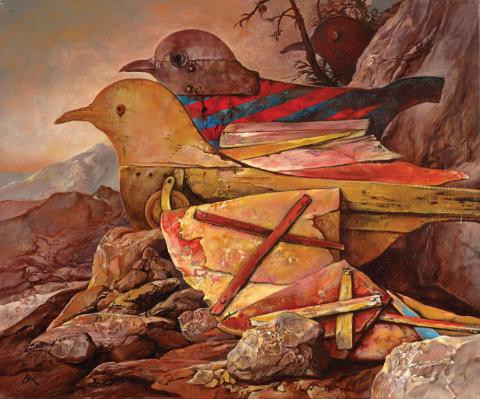
Samuel Bak
b. 1933
_______________________
The Trauma of New Materialism, Speculative Realism, and Object-Oriented Ontology
Larval Subjects
... Tonight I find myself reflecting on all of the controversies that new materialism, speculative realism, and object-oriented ontology have generated in the last few years. In recent years I’ve heard these vectors of thought criticized for supporting neoliberal capitalism to hating humans to asserting the dominance of things over humans. I’ve always found such criticisms surprising, wondering where it is from which they might come. What is it about these trajectories of thought that elicit so many passions. Is there something new here? I’m not so sure. ...(more)
_______________________
The Material Unconscious
Larval Subjects
(....)
Everywhere things crowd in on us, exercising a strange sort of power that structures our lives, the lives of other organic beings, and that affects the totality of the planet. It is that field of invisible things that are everywhere visible that is the material unconscious and that today calls for thought. Recognizing that the material unconscious mediates our agency is not a defeatist thought, but is the first step towards developing real agency; an agency that is not merely the order of thought. We must develop a politics of things; a politics that involves building, designing, and constructing and not merely legislating and persuading.
...(more)
_______________________

Samuel Bak
_______________________
The Test of Fantasy
Joanne Kyger
(....)
4.
We of course are in a family situation. Anything I wish might
happen, but the larger situations are not real, not to be
considered possible, discussable as to what sense of reality
they possessed.
In the snow, the wood piled up underneath. Oh those drifting
sensibilities. At this point it is scarcely believable that people
gather and like each other. Eating chocolate pudding, getting
in touch with some other sense of alikeness. The form is no
longer obvious to me. Whether they meander or are joined together
in their senses in the mechanics or regular grooves they run along.
I suspect that in this house, this
place that is musty and left as it was some years ago, there is
no real fear; the objects are old and I am not familiar with them,
only the sense that the Ghost or spirit world strikes you with
its familiarity, pleasurable fear.
Here the familiar
is apt to make its presence known, at any moment the unexpected
lurk in the hall, into the room. Pieces of leather, old silken fans
laid upon the table top, rooms filled with something left unexpectedly
terror is the wrong combination of ignorance. It contains its own
self with dusty fragments of velvet and fringe. 100 pieces of voice
with no name, called it myself, as they spoke all day, sucking the
soft slush, admitting their real deficiencies as—
I am never sure; Oh it’s that power
and disease of believing in the stale that doesn’t demand a real
climate, takes its capacity when the demons come down.
...(more)
Joanne Kyger at EPC and the Poetry Foundation
Joanne Kyger Feature
edited by Linda Russo jacket 11_______________________

Flooded Trench on the Yser
Christopher Nevinson
1889 - 1946
_______________________
Growing up under Different Skies
Reflections at the Einstein Forum
Diana Pinto
public seminar
(....)
Lives lived among very different skies are often perceived by those who have led far more static childhood existences as fabulously interesting, even thrilling. But is this really the case? My aim here is to show that there is a quite a bit of scuro while growing up in such a chiaroscuro setting. The fields may be vast but the depth of field may be hard to come by. For those who might think that such a fate is reserved only for the elites of a happy few, think again. Never have there been so many people either made to or choosing to live between worlds across the planet. The number of refugees and displaced persons has now reached World War II levels; the number of immigrants and economic laborers never ceases to grow. The world, the optimists say, is on the move. Gone are the heavy suitcases of definitive one-way trips. Cheap cell phones for the indentured servants of today and satellite dishes in the balconies of many an immigrant’s apartment, along with low cost flights everywhere, maintain in all of their ambiguity the daily ties to lands of origins easily transformed into lands of new futures. Everywhere in our increasingly interconnected planet there are children who grow up at the crossroads of these splintered lives, straddling divides that determine how they grow up and the kinds of adults they will become. Growing up is difficult everywhere but my hunch is that when one adds different skies to the mix, the task takes on a different dimension: it may slow down or instead accelerate the process, but either way, it will condition it by imposing different stage sets, different lights, and above all different lines in the play of life.
...(more)
_______________________

George Luks
1867-1933
_______________________
The Semantic Apocalypse
Speculative Heresy:
... a lecture entitled “The End of the World As We Know It: Neuroscience and the Semantic Apocalypse”. (Held at Canada’s premier interdisciplinary department: The University of Western Ontario’s Centre for the Study of Theory and Criticism.) Thanks to the lecturer, Scott Bakker, and the other respondent, Ali McMillan, I’m happy to post the entire lecture here as well as the responses.
Scott Bakker, “The End of the World As We Knew It: Neuroscience and the Semantic Apocalypse”
Nick Srnicek, “Neuroscience, The Apocalypse, and Speculative Realism”
Ali McMillan, “Compatibilism and Free Will”
The Speculative Turn: Continental Materialism and Realism
Levi Bryant, Nick Srnicek and Graham Harman (eds.) re-press
_______________________
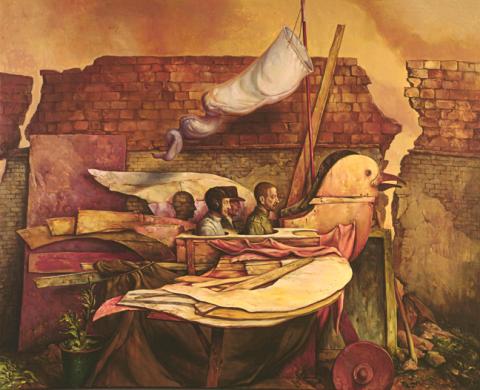
Samuel Bak
_______________________
Conversations in Critical Making
edited by Garnet Hertz
CTheory Blueshift Series
Preface
Garnet Hertz
Critical making, as a term, was initially used by Matt Ratto in 2008 and first published in 2009 to describe the combination of critical thinking with hands-on making, a kind of pedagogical practice that uses material engagements with technologies to open up and extend critical social reflection. In Ratto's words, "critical making is an elision of two typically disconnected modes of engagement in the world--'critical thinking,' often considered as abstract, explicit, linguistically based, internal and cognitively individualistic; and 'making,' typically understood as material, tacit, embodied, external and community-oriented." Ratto wanted the term to act as glue between conceptual and linguistic-oriented thinking and physical and materially based making with an emphasis on introducing hands-on practice to scholars that were primarily working through language and texts, like in the fields of communication, information studies, and science and technology studies.
...(more)
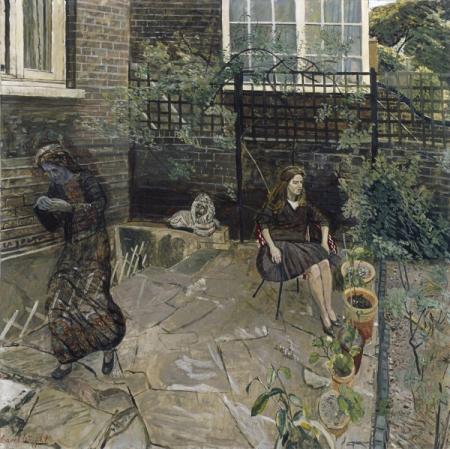
Carel Weight
1908 - 1997
_______________________
Sunday in the Storm Era
Joanne Kyger
from The Distressed Look
"these are extraordinary times"
so we can do whatever we want ha ha
the sky darkens
stitching the white pillow cover
If I had my way I'd sit and watch
the grey and poundy waves all day ...
The candle lights for Cypress
must be down at the channel now
where the tide rushes out
from the lagoon and keeps on going out
way out ... remember?
now the evening sky
looks pretty clear
that
was a history
just happened

Harmony in blue and silver: Trouville
James McNeill Whistler
1834-1903
_______________________
Hermetically Open
Gherasim Luca
Translated by Michael Tweed and Raphaëlle Dedourge.
love torrent emptiness chair empty chair empty torrential chair suspended in the metavoid the metachair is hanging by the torrential rope of the metavoid the metarope tightens and absorbs the torrential metaneck of the man hanging by the rope around the woman's neck around the fuzzy floating neck of his metawoman empty torrential and sitting the torrential metawoman is sitting on the chair sitting on the emptiness of her chair she perpetually metafloats in the absolute metavoid of my absolutely torrential desires absolutely meteoric and substantial the metahead of the substantial and meteoric metawoman suddenly appears like an arrow between the metathigh of my dreams and the metateeth of my desires swift biting arrow which slightly bent leans against the back of the metachair of my dreams and desires always sitting always unpredictable and absolutely dazzling the metawoman floats and metafloats always in the void her little metaflame visible by transparency ...(more)
Surrealism in a Minor Key: Recent Translations of Ghérasim Luca
Michael Leong
Considered through Deleuze and Guattari’s somewhat idiosyncratic interpretive lenses, Ghérasim Luca is a minor writer — minor in the sense that he relentlessly pushes language toward its limits, that he deterritorializes it, that he transmutes it from a mere instrument of representation into an extreme style of intensities. This is to say that Luca should not be deemed “minor” in any canonical sense — quite the opposite in fact — for within Deleuze and Guattari’s system of thought, to be called minor is an honorific of the highest order. This is also to say that Luca should be recognized, once and for all, as a figure on par with the other so-called “minor” auteurs within Deleuze and Guattari’s pantheon: Kafka, Beckett, Joyce, Pasolini, and Godard (see, for example, A Thousand Plateaus and Kafka: Toward a Minor Literature). In Two Regimes of Madness, Deleuze has claimed in no uncertain terms, “[o]ur greatest poet in French is Gherasim Luca — of course, he is from Romania. Luca knows how to stammer not just words, but language itself; he invented it.” In a U.S. context, Luca remains obscure. He was, for example, recently featured in the laconically titled blog Writers No One Reads. And while seven impressive poems from Hero-Limit (translated by Fiona Sze-Lorrain) appeared in Poetry International 15/16 (2010), a journal based at San Diego State University, his name was deemed not enough of a selling point to make the issue’s front cover (which lists 29 other contributing writers from America and abroad). Now that several of Luca’s key texts — The Passive Vampire, Inventor of Love, and Self-Shadowing Prey — are available in English, it is time that we begin to appreciate his accomplishments as one of the most brilliant and provocative poet-theorists of the European avant-garde.
...(more)

Ghérasim Luca
from Self-Shadowing Prey
Ghérasim Luca
translated by Mary Ann Caws
presented by biblioklept
at the edge of a forest
whose trees are slender ideas
and each leaf a thought at bay
the vegetal reveals to us
the damned depths of an animal sect
or more precisely
an old insect anguish
waking up as man
the only way
the only basic weapon
to animate a mental state
that I hurry to write mantil
like a mantis
if only to mark
with a dry warning laugh
the devouring word
Entity and antithesis of the bush
a sort of wild and organic brush
grows in the head of that man
ravaged
by the heresy of parks and greenhouses
...(more)
The Dialectic Of Dialectic
A Message to the International Surrealist Movement Ghérasim Luca
Objective Phantoms
Kenneth Cox reviews Ghérasim Luca's The Passive Vampire, translated by Krzysztof Fijalkowski
A Voice from the Shadows
Michael G. Kelly on Ghérasim Luca
_______________________
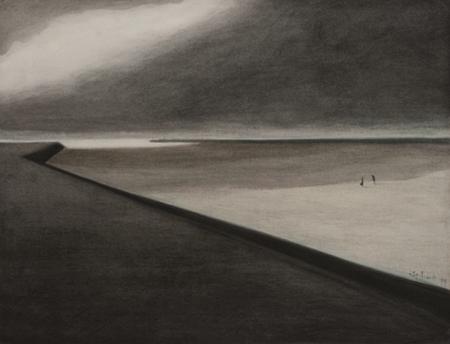
Digue et plage
1907
Léon Spilliaert
1881-1946
_______________________
On Galloway
McKenzie Wark on Alexander Galloway's book, The Interface Effect
(....)
Galloway thinks one can map the times as a shift from the ideological to the ethical mode, and a generalize “decline in ideological efficiency.” I suspect it may rather be a shift from the ideological to the nihilist, but which cannot declare itself, leading to a redoubling of efforts to produce viable ideological modes despite their waning effect. (The sub rosa popularity of Nick Land finds its explanation here as delicious and desirable wound and symptom).
Either way, the mechanism – in a quite literal sense – that produces this effect might be the transformation of the interface itself by computing, producing as it does an imaginary relation to ideological conditions, where ideology itself is modeled as software. The computer interface is an incoherent aesthetic that is either in the service of a coherent politics (Galloway’s reading), or, which wants to appear as such but is actually in the service of an incoherent politics that it cannot quite avow (my reading).
(....)
What does it mean to visualize data? What is data? In simple terms, maybe data are ‘the givens’, whereas information might mean to give (in turn) some form to what is given. Data is empirical; information is aesthetic. But data visualization mostly pictures its own rules of representation. Galloway’s example here is the visualization of the internet itself, of which there are many examples, all of which looking pretty much the same. “Data have no necessary information.” But the information that is applied to it seems over and over to be the same, a sort of hub-and-spoke cloud aesthetic, which draws connections but leaves out protocols, labor, or power.
Maybe one form of what Jodi Dean calls the “decline in symbolic efficiency” is a parallel increase in aesthetic information that goes hand in hand with a decline in information aesthetics. There’s no necessary visual form for data, but the forms it gets seems to come from a small number of presets.
...(more)
_______________________
Existential Google
Dustin Illingworth
full-stop
For all of its chilly white space and algorithmic anonymity, it struck me recently that Google autocomplete is one of the more communal experiences I take part in on a day to day basis. You’re no doubt familiar with autocomplete: type in the beginning of a question or statement and Google will offer a set of predictive endings, based on search volume, to speed you toward the desired information. At first blush, this functionality appears to be nothing more than a kind of streamlining, an attempt to shave valuable milliseconds from billions of daily search processes — that is, nothing more than a striving after efficiency. But in the rush to get to the bottom of our own obscure or banal questions, it’s easy (and sometimes necessary) to ignore what these predictive searches really are: a kind of social cipher, an anthology of digital anxieties, a collective dreaming. ......(more)
_______________________

The Open Door
Léon Spilliaert
1945
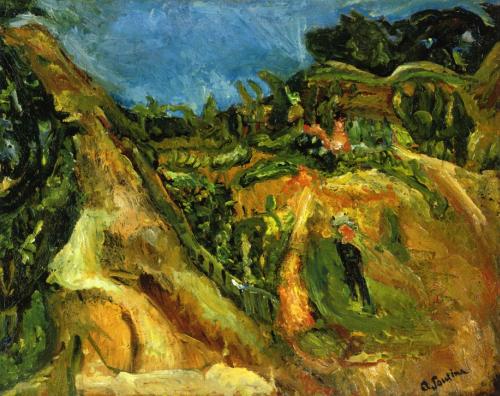
Midday Landscape
Chaim Soutine
c.1918
_______________________
The Imperative to Write: Destitutions of the Sublime in Kafka, Blanchot and Beckett by Jeff Fort
a review by Stephen Mitchelmore
This Space
(....)
We've come a long way from the initial compulsion to write, with the image of an infinite library replaced by an infinite nothing beyond its infinite shelves, and perhaps as a result a greater sense of the uselessness of writing. Except it is in the denial of reality in its widest sense as characterised in The Unnamable that our sad and frustrated compulsion to write persists. What excites me about The Imperative to Write is that it presents a perspective on what we carelessly call experimental writing that might catalyse many a writers' despondency and turn it into the work they were born to write. It is certainly one of the most extraordinary books about literature that I have ever read, one that has compelled me to write about in order to raise awareness of its ideas.
In the months it took me to read (the text including the notes reaches a quarter of a million words) I couldn't help but wonder about its own relation to the destitution of the sublime, and this intensified during my troubled attempts to summarise such a complex and detailed book, steeped as it is in philosophy and close readings of all three writers in their original languages. That is, what relation does this have in terms of literary history to the works under discussion, or, more specifically, are the works under discussion themselves kinds of summaries, albeit a highly stylised, of what such a profound study thickens and fills out, so that critical exposition is not so much secondary text feeding like a parasite on the larger organism but a continuation of the same movement in the form specific to our time, much as Luther and Kant might be considered as part of the genealogy of modernism despite the forms taken by their writings? In one aside, Fort refers to modernism as "a name for the sounding and unfolding of depth and interiority, its radical externalisation: inwardness as boundless exteriority," which happens to be a good way to summarise the first two volumes of Knausgaard's My Struggle, books that transcend their rather mundane, non-experimental form because they reach toward the distant horizons of a life. And remember, the writings by which we know Kafka, Blanchot and Beckett take many different forms – diaries, letters, short stories, novels, plays, poems, even critical essays and book-length studies – with not one demanding any fundamental priority. In contrast, contemporary works of such dispersed singularity and focus appear to be impossible, as if the disenchantment of the world, which might be another name for the destitution of the sublime, has been internalised to such an extent that fiction in particular is content to be trapped in its own freedom, its own blank space of infinite invention.
...(more)
_______________________

boat trip
1910
Wassily Kandinsky
1866-1944
_______________________
A Placebo
By Mei-Mei Berssenbrugge
1
We call change in a person the effect of time, witness my new dress, so short,
with buttons on the yoke shaped like swans.
I enter from the back of the room, pausing at the hopeful energy of people
gathered to see me.
They are a surface, alive and redolent, half unseen, like iridescent cloth.
I sense structure spontaneously form, as when crossing the room to greet you,
what I say forms.
And I worry that spontaneity acts for its own reasons, not mine.
My dress is a visual image of unconscious affirmative processes, the way spontaneity
expresses its order, as I create a world, stocking it with small dogs on the runway,
handbags, a bouillonne of rose tulle at the waist of a jacket.
So, I'm not limited to what I observe, rather than feel.
...(more)
Mei-mei Berssenbrugge at EPC, the Poetry Foundation and PennSound
Mei-Mei Berssenbrugge Interviewed
by Michèle Gerber Klein bomb
Three Conversations with Mei-mei Berssenbrugge
Laura Hinton
jacket 27
Sentimental spaces
On Mei-mei Berssenbrugge's 'Nest'
Natalia Cecire
jacket2
(....)
Bachelard and Lefebvre reveal the power with which the figure of the animal — the figure of the bird in particular — triggers actions of metonymy and allegory in an otherwise literal analysis. The birds’ nest becomes an allegory for the home, and the birds and their habitat become a metonym for nature, such that the human home is itself granted the status of nature, absolute space. It is Bachelard’s reliance on metonymic and allegorical logic that leads Lefebvre to call him a “philosopher-poet.” The gesture that makes the home autonomous from capital and exempt from production is also a gesture of slippage, a sleight of hand, visible, yet pardoned for sentimental reasons. The poetic here looks very much like mystification, in other words.
When we read Mei-mei Berssenbrugge’s 2003 book of poems Nest, we must therefore do so through the complex that the word “nest” conjures up: of domestic space, its reliance on the animal, and its sentimental-poetic failures. Nest is about space, and especially the privileged so-called domestic space, rendered in relation to the animal as well as in relation to the “experimental” poetics for which Berssenbrugge is known. Berssenbrugge’s poetry is often characterized by a scientific and philosophical vocabulary that points toward a commitment to knowledge and, consequently, an experimental tradition associated with sinewy, even ascetic forms. Yet the poems of Nest are neither sinewy nor ascetic, nor even lush in the emotionally satisfying sense we might imagine, but rather something more like “downy.” There is a self-conscious excessiveness to Nest that examines, and toys with inciting, the very longings that Bachelard investigates and Lefebvre fingers with suspicion. Nest is embarrassing, in the way that the “poet-philosopher” Bachelard’s analysis is embarrassing — in the way that the poetic functions triggered by the animal are themselves embarrassing, when we find ourselves using them to sentimental ends. By invoking the old allegory and presenting human dwelling as a nest, Berssenbrugge suggests that domestic spaces depend not only on a nostalgic analytic failure but also on an embarrassed recognition of that failure — that a certain sentimentalism is the necessary concomitant of (as the final three entries of the table of contents read) “SAFETY.”
...(more)
_______________________

Karl Schmidt-Rottluff
_______________________
Capitalist Realism And Neoliberal Hegemony: [pdf]
A Dialogue
Mark Fisher and Jeremy Gilbert
Abstract
This is a dialogue conducted over email by Mark Fisher, author of the widely-read Capitalist Realism: Is There No Alternative and Jeremy Gilbert, editor of New Formations. The discussion touches on issues raised by Fisher’s book, by some of Gilbert’s work as a theorist and analyst, by some of the political commentary in which each has engaged at various times (online and in print), as well as by the recent prevalence of a certain identification with anarchist ideas and methods amongst activists and online commentators whose intellectual and political reference points are otherwise very close to those of the Fisher and Gilbert. It considers the concept of ‘capitalist realism’ as a way of understanding neoliberal ideology and hegemony; the role of bureaucracy in neoliberal culture and the ‘societies of control’; the types of political and cultural strategy that might be required to challenge their hegemonic position; the relationship between political strategies which do and do not focus on conventional party politics; the general condition of politics in the UK today. Although largely concerned with a specifically British (and, arguably, English) political context, its consideration of abstract issues around the theorisation of ideology and neoliberalism and the nature of political strategy have far wider applicability.
Lawrence & Wishart: A journal of culture/theory/politics
via Deterritorial Investigations Unit
_______________________

Karl Schmidt-Rottluff
1884-1976
_______________________
The Secret Life of Our Prostheses
Belinda Barnet
ctheory
We are born into a world of things. From masking tape to Mandarin, from computers to swaddling cloth, we enter into an existing cultural and technical system. Our sensory, cognitive, and motor faculties are put to work immediately to learn what others before us have learned: to make sense of these things, how to operate them, and our place among them. This is a long process for infants--their cognitive function is literally shaped through what is called synaptic or axon pruning (if there are any Cultural Determinists in the room, they should leave now and read some neuroscience journals). We must learn how to speak, how to use pens and toothbrushes and iPads, how to ride a bike, how to manipulate a spoon so the peas don't (or do) fall onto the floor. When we are born, we enter into something that we have not individually created but which, nevertheless, shapes our experience of the world. This is what Heidegger calls the already there, this "past that I never lived but that is nevertheless my past, without which I would never have had a past of my own." It is also what Douglas Engelbart, the inventor of the WIMP interface and the computer mouse, calls our "augmentation system."
Our augmentation system is more than just technology; it includes the whole subset of learned behaviours and physiological capabilities that allow humans to modulate and interact with our environment. It includes steering wheels and laptops--but it also includes the social structures we live within, the techniques and discourses we acquire, the "training, knowledge and skills that have to be installed as well as language, an extremely important invention." This is a giant, complicated structure that has evolved over generations. Most importantly, the elements within this augmentation system are acquired. We are not born with them; we are born into them and take them on as our own.
...(more)

Alle Falde Del Vesuvio
Giuseppe De Nittis
1846 - 1884
_______________________
against the masters of speed: reflections on a frenetic standstill
Niklas Plaetzer
(....)
In the end, we return to Walter Benjamin’s famous phrase that although Marx might have seen revolutions as the “locomotive of world history,” they are, instead, “an attempt by the passengers on this train – namely, the human race – to activate the emergency brake.” If the political is not asserted in its temporal dimension, the train of economic necessity will only lead to its gradual disappearance in the repetitive hectic of a frozen presence. With the rise of financial markets and digitization, a transformation has occurred which has already moved towards the synchronization of polis and oikos at a post-political speed. The instantaneous time of financial capital has consequently had devastating effects on the functioning of democracy and our sense of political possibility. Drawing from the work of Hartmut Rosa, we are led to conceptualize forms of temporal resistance, which make the re-emergence of a “window of speed” (Geschwindigkeits fenster) for democratic politics their explicit objective. If the political is to survive against the domination of the instantaneous time of finance and digital transmission, critical thinking must come to appreciate its inherent slowness. Only a politics of time, directed against today’s “masters of speed,” will be capable of carving out a time of politics, which is a necessary condition for any project of democracy. ...(more)
_______________________
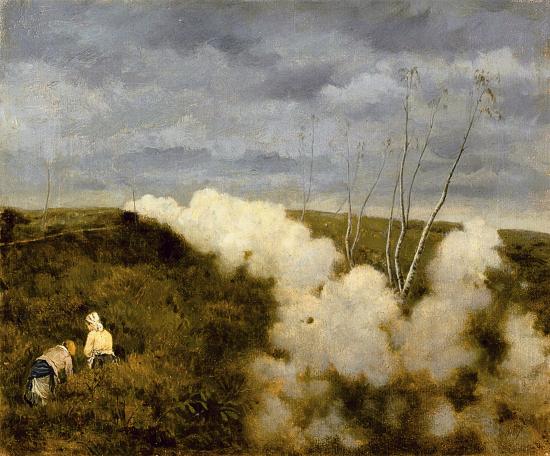 Passa il treno
Giuseppe De Nittis
_______________________
Disposable Futures: Dystopia the Neo Liberal Reality
Robert Birnbaum on Disposable Futures The Seduction of Violence in the Age of Spectacle by Brad Evans and Henry A. Giroux
our man in boston
I am going to risk assigning the valence of “importance’ to this book as its conclusions leap past the news cycle’s reportage on state sponsored war on minorities, jarring statistics on gun deaths, the dissonant revelations on the incarceration industry in the World’s leading jailor and the USA’s exceptional death merchantilism and explores the undercurrent of violence that allows for such dystopia
Etienne Balibar (Violence and Civility) opines
Beginning with Primo Levi and ending with Deleuze, Evans and Giroux map the radical transformation that has affected the representation of cruelty between the 20th and the 21st century: from ‘exceptional’ status, associated with the ultimate figures of state sovereignty, it has passed to ‘routinized’ object of communication, consumption and manipulation. This is not to say that everything is visible, only that the protocols of visibility have been appropriated by a different form of economy, where humans are completely disposable. To counter this violence in the second degree, and preserve our capacity to face the intolerable, a new aesthetics and politics of imagination is required. This powerful, committed, exciting book does more than just evoke its urgency. It already practices it.
...(more)
_______________________
Against Sharing
Avi Asher-Schapiro
(....)
Uber is part of a new wave of corporations that make up what’s called the “sharing economy.” The premise is seductive in its simplicity: people have skills, and customers want services. Silicon Valley plays matchmaker, churning out apps that pair workers with work. Now, anyone can rent out an apartment with AirBnB, become a cabbie through Uber, or clean houses using Homejoy.
But under the guise of innovation and progress, companies are stripping away worker protections, pushing down wages, and flouting government regulations. At its core, the sharing economy is a scheme to shift risk from companies to workers, discourage labor organizing, and ensure that capitalists can reap huge profits with low fixed costs.
There’s nothing innovative or new about this business model. Uber is just capitalism, in its most naked form.
...(more)
_______________________
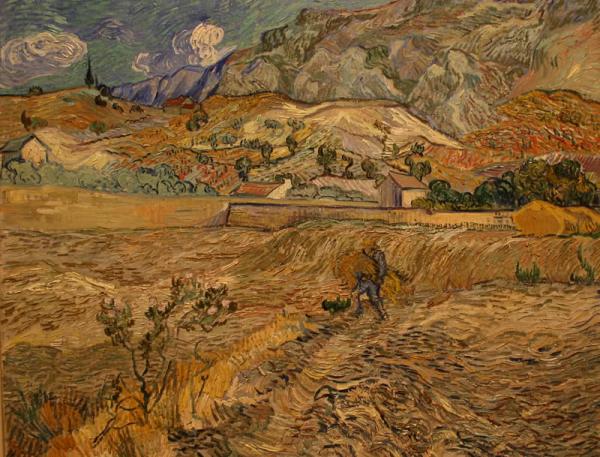
Landscape at Saint Remy
Van Gogh
_______________________
“The Waters of the World”
Clarice Lispector
translated by Katrina Dodson
asymptote
There it is, the sea, the most unintelligible of non-human existences. And here is the woman, standing on the beach, the most unintelligible of living beings. As a human being she once posed a question about herself, becoming the most unintelligible of living beings. She and the sea.
Their mysteries could only meet if one surrendered to the other: the surrender of two unknowable worlds made with the trust by which two understandings would surrender to each other.
She looks at the sea, that’s what she can do. It is only cut off for her by the line of the horizon, that is, by her human incapacity to see the Earth’s curvature.
It is six in the morning. There is only a free dog hesitating on the beach, a black dog. Why is a dog so free? Because it is the living mystery that doesn’t wonder about itself. The woman hesitates because she’s about to go in.
...(more)
_______________________

A View of Cromer Sands, Norfolk
Robert Finlay McIntyre
c.1846-1906
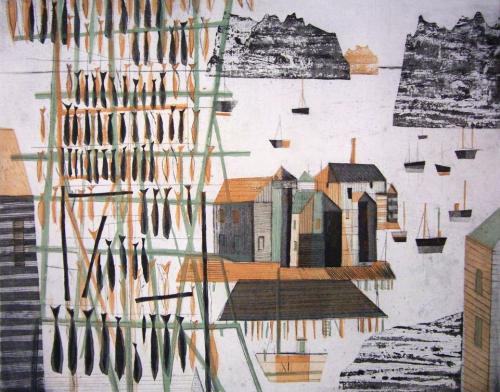
Rudolf Kügler
1921 - 2013
_______________________
Soft White
Lee Harwood
(1939-2015)
When the sea is as grey as her eyes
On these days for sure the soft white
mist blown in from the ocean the town dissolving
It all adds up her bare shoulders
Nakedness rolling in from the sea
on winter afternoons – a fine rain
looking down on the sand & shingle
the waves breaking on the shore & white
It is impossible to deny what
taken by surprise then wonder
the many details of her body
to be held first now then later
In body & mind the fine rain outside
on winter afternoons the nakedness
of her bare shoulders as grey as her eyes
the sea rushing up the beach as white as
The whole outline called ‘geography’
meeting at a set of erotic points
lips shoulders breasts stomach
the town dissolves sex thighs legs
Outside then across her nakedness
it rains in the afternoon then the wonder
her body so young & firm dissolves the town
in winter grey as her eyes
_______________________
Collected Poems
Lee Harwood
Shearsman Books
PDF sampler
_______________________

Rudolf Kügler
_______________________
Sailing Westwards
Lee Harwood
(....)
The dowager empress sharpening her nails
while in the kitchens the workers scurry around,
maybe laughing quietly, and in remote fields
villagers hoe and plant, haul heavy loads.
On a street corner, as crowds flow by
,
‘What are you doing?’ ‘Nothing in particular.’
A few more years to go. But then suddenly
that music plays, lifts me to I know not where.
So where’s the boat?
A sampan or a lugger?
or an elegant steam launch?
Is there room for me and that crew of sages?
Zig-zag around, as usual.
What’s to be seen in the old woman’s curio cabinet?
Ivory carvings, plates, cups, and a blue glass sugar-shaker.
We just don’t know the full story.
On the vast beach at Harlech
scattered with tellin shells and razor-shells,
dunes topped with marram grass behind me
and the dark blue grey mountains behind them,
and the flat silk sea spreads out in front of me,
over and far beyond the horizon.
...(more)
_______________________
Lyric Impulse In A Time Of Extinction
Anne Marie Macari
american poetry review
(....)
That word, extinct, is a shape-shifter in my thoughts—it is biological, environmental, philosophical, and deeply personal. It can be a kind of depression or general despair, a horrifying concern for other species, for my species, but it also brings other things to mind: genocide, the death of languages and whole cultures. I am haunted by our cultural and religious belief in our superiority over those with whom we share the planet:
And God said, Let us make man in our image, after our likeness: and let them have dominion over the fish of the sea, and over the fowl of the air, and over the cattle, and over all the earth, and over every creeping thing that creepeth upon the earth. (Genesis 2:26)
Extinction is part of the language of war in which villages, or cities, or cultures, or eco-systems are wiped out, and rape, pillage, collateral damage, are normal words.(....)
How do we write when these questions threaten to swallow us? First, to be sure, we enter through the body of our everyday lives; through the everydayness of experience we attempt to write our way toward what we can’t seem to articulate. Poets have a belief in language, perhaps beyond all else, poetry in particular beyond all else. As Dickinson says, “I reckon when I count at all, first poets, then the Sun, then Summer, then the Heaven of God, and then the list is done.” Is it the liberating power of metaphor—the language of poetry—that moves her toward such self-empowerment? Metaphor is transformation; it is the discovery of meaning that we could only anticipate but could not find words for.
...(more)
_______________________
Words without Borders August 2015
Myth and History: Writing from Indonesia
Story
Hasif Amini
Translated from Indonesian by Marjie Suanda
(....)
... Poetry is a pen that is dreaming, suggested the philosopher Gaston Bachelard. Day after day it continues to encounter an increasingly limited, specialized, and devoted public. Of course, that is not necessarily a bad thing. There is nothing to regret. The lyric tradition that loyally gives voice to the whisperings of the heart has its own history, which is also long.
However, poetry in modern times has encountered several forms of unexpectedly militant enthusiasm. One of these is an enthusiasm that wishes to find an essence in poetry that cannot be found in other expressive forms. I remember a story about the late Jose Garcia Villa. This leading Filipino poet, who spent most of his life among the avant-garde artists of twentieth-century New York, wished to “purify” poetry by cleansing it of even the smallest narrative elements. Poetry must only embody the magical presence of word after word, image after image, sound after sound.
And yet, perhaps there is indeed something in us which is easily impressed by a chain of cause and effect events, with situations full of action and characters who seem to breathe. Thus, poems that are powerful in conveying a story, that distill the drama of human encounters, live on in memory, or will always rise from the dust to be retold. Kasan and Patima or Maria Zaitun from the ballads of Rendra, the first man in space from Subagio Sastrowardoyo, the little girlfriend of Joko Pinurbo: these are a few, among so many others, of the unforgettable characters born in poetry, named or nameless.
...(more)
_______________________

Le Pont du Labastide
Henri Martin
1860 - 1943
_______________________
Economic Globalization and Mental Health
Individual suffering in social context
Neil Altman
public seminar
(....)
... My impression is that few mental health professionals keep up with the details of economic globalization and its impact on culture and mental health. In this article I will briefly present two ways in which economic globalization has a huge and largely unrecognized impact on the lives and work of psychologists and other psychotherapists in the United States and the rest of the world.
(....)
Globalization is an abstract concept; few people who concern themselves with the feelings and psychological state of individuals and families take the time to understand how the system works and how it is perpetuated. Failure to take account of the systemic context for people’s distress results, however, in over-pathologization of individuals, by the professionals who diagnose and treat them, and by the individuals themselves who come to blame themselves, in a one-sided way, for their unhappiness.
...(more)
_______________________
Guerrilla Texts: Toward an anti-authoritarian cultural logic
Sandra Jeppesen
academia.edu
Abstract:
For anarchists, cultural production is part of a larger struggle. It is a struggle against socially inherited forms of oppression and toward the creative production of liberation and social transformation even as we produce 'guerrilla texts.' Guerrilla texts are irregular non-uniform anti-authoritarian texts combating a much larger normalized authoritarian system of textual production that tends to be capitalist, patriarchal, heteronormative, racist and/or ableist. This combat is not just a discursive struggle over the content and aesthetics of texts, nor is it simply a material struggle over the economics of production seen as a refusal of profits and co-optation, nor is it just a careful attention to non-hierarchical cultural production processes; rather it is a struggle to be true to an entire range of anti-authoritarian principles and values, to produce non-didactic texts that open people's minds to new possibilities, to develop a sense of individual and collective autonomy and self-determination, and to produce cultural producers who experience liberation, joy overflowing, love without end, and other sustained outbursts toward transformative social relationships. This may be a rather ambitious set of tasks to have before us when we are making a book, video or zine. Nonetheless it is this kind of profound transformative project that is at state in anarchist culture as we 'phase authorities out slowly.'
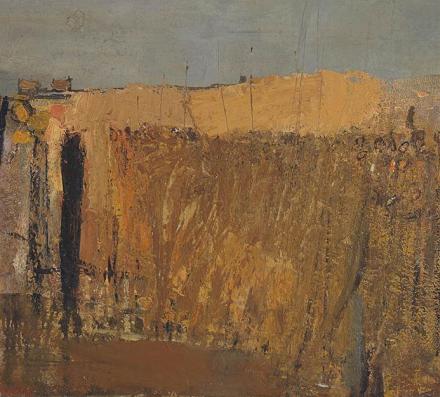
Wheat
Joan Eardley
1921 - 1963
_______________________
Three Geographical Variations
Kenneth Irby
(....)
*
I will not let blood and I do not know
if there is any turning back upon the land
to traverse, how much
traversing now will reopen
what spaces seem nowhere
ease us together—it is not different to go past
the endless misuse of landscape
here in Berkeley or there in New Mexico, what space
is open beyond is open across the whole world
Looks past whatever salvations of individuals
realizing salvation is only to pass
into the space all people live in
*
There is no need to substitute any world for this one
in order to come into any wonder or more
enter the open imagination. Good and evil
seem kindness and indifference
at each footstep
At the other edge of each tree
another pasture
the shade fallen on each face into the sun
Into each lit house dark street we walk home
The stories where we are all changed
beyond the wardrobes back wall
pass through
The eye is blue wonder brown opener the horizon
shines through upon the toss and fling the ring glints
head up in the air
grass goes by
like starlings
iridescent in the sky
...(more)
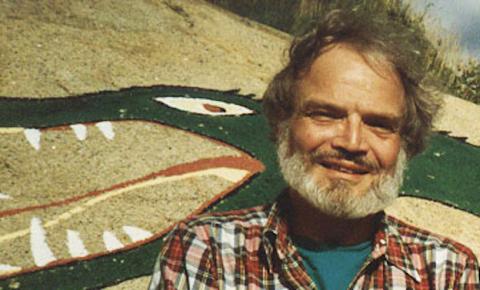 Kenneth Irby
(1936 - 2015) Kenneth Irby at EPC and PennSound
Kenneth Irby’s The Intent On
John Latta
Isola di Rifiuti
Coldish sun-slanting late March six o’clock amongst a folderol of bookish tumulus, burial “mounds.” That is, the books stack up against perennial shelflessness, lost in knee-high tightly snug’d piles. Filling a narrow corridor between the shelf itself and the table. De temps en temps I shift and uncover: redistributing, trying to determine and guide my own upcoming enthusiasms and intents. Or my dour indifferences. I keep dipping into the monstrous (glorious) anchor (or sky hook) of one pile—Kenneth Irby’s The Intent On: Collected Poems 1962-2006, edit’d by Kyle Waugh and Cyrus Console (North Atlantic Books, 2009). My remarks here inchoate, wing’d, desultory, though hardly tepid. Like all Kansas, it is something unruffled and wholly inhabitable: not a page without its magnificent thing:
Hölderlin called the lyric
“the continuous metaphor of a feeling”
the epic, “the metaphor
of an intellectual point of view”
this is the discontinuous
dendritic narrative of a journey
metaphor of pasture, anabasis and return
pastoral in that
“sluicing” meaning the juice
runs down over the head
and puddles off the fingers
That’s out of a piece call’d “Jed Smith and the Way,” though one of the things one sees with floody (oceanic, grassy) immediacy in Irby is how a writerly continuum pulls flat the fences. Is that Kansas again? Ronald Johnson construct’d an ARK out of prairie. Edward Dahlberg of Kansas City once readily recognized that Flaubert’d “said once that an artist should look long and intently at an object until he could discover some shadow or line in it that had not been seen by any other one before reproducing it”—is that “the intent on”? (There is, one hears tell, the makings of a “soi-disant Topeka School” including Ben Lerner—who begins a piece “For the distances collapsed” and editor Cyrus Console—who ends a piece “Huge, empty, he could not progress but with drifting, but in a way he had won. The air, trapped by its own weight, pushed the blimp higher into the sky.”)
...(more)
_______________________
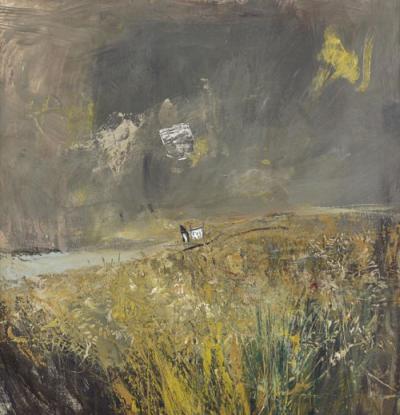
Joan Eardley
_______________________
proof through the night
S.D. Chrostowska
an excerpt from Matches, a book of aphorisms and fragments
(....)Merveille du jour
Modern philosophers proclaimed the untimeliness of their task. Knowing things only in the dying light, observing unfashionably, philosophy settled on a grisaille palette to paint its grey in grey, and adopted a soaring perspective above the day’s influences. It turned its necessary late-coming and monochromia into epistemic insight and night vision (for approaching night). With its youth—which, as Hegel had it, did not rejuvenate but aged or overcame the timeworn—it avenged itself on the “old reality” that it failed to comprehend live.
And still it moves beneath the ragged cloak of twilight, which it throws over its bright prey. Isn’t it time, philosophy, for a hint of colour?—for contrast if the times seem drab, and otherwise for camouflage. A subtle cast of purple or green would become your grey, as it does the owlet moth that flies by night but by day mesmerizes with the beauty of its shading.
...(more)
_______________________
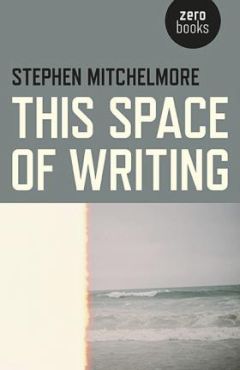
This Space of Writing
Stephen Mitchelmore
This Space as a book, introduction by Lars Iyer, cover photo by Flowerville
Zero Books
What does 'literature' mean in our time? While names like Proust, Kafka and Woolf still stand for something, what that something actually is has become obscured by the claims of commerce and journalism. Perhaps a new form of attention is required. Stephen Mitchelmore began writing online in 1996 and became Britain's first book blogger soon after, developing the form so that it can respond in kind to the singular space opened by writing. Across 44 essays, he discusses among many others the novels of Richard Ford, Jeanette Winterson and Karl Ove Knausgaard, the significance for modern writers of cave paintings and the moai of Easter Island, and the enduring fallacy of 'Reality Hunger', all the while maintaining a focus on the strange nature of literary space. By listening to the echoes and resonances of writing, this book enables a unique encounter with literature that many critics habitually ignore. With an introduction by the acclaimed novelist Lars Iyer, This Space of Writing offers a renewed appreciation of the mystery and promise of writing.
...(more)
_______________________
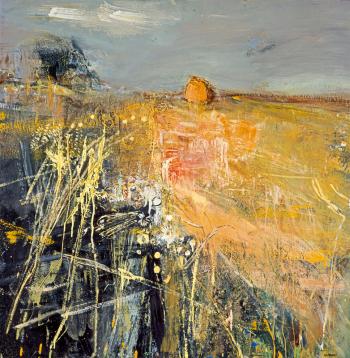 summer fields
Joan Eardley
_______________________
Irby's very own North Atlantic turbine
Pierre Joris
jacket2
(....)
The view, it is my argument here today, of Irby’s work as a simple or even complex extension of Olson’s quest seems too limiting to me, diminishing the achievement by proposing too reductive a reading. And if in my title I used a phrase that recalls Edward Dorn,[4] it is not so much for the jaundiced eye with which Dorn gazed at that turbine (which he saw nearly exclusively as commerce moving clockwise) but as a more cultural turbine moving counterclockwise — thus making it a countercultural turbine? — and enriching the dustbowl soils of America. Or maybe this turbine is closer to Henry Adams’s “dynamo,” though then one would have to read a near-Hegelian “Aufhebung” in Irby’s version of the “Virgin and the Dynamo.” It may, in fact, appear strange that I, ex-Europeano who left the “old” continent to become a poet in America because that is where I saw the energies achieve a poetic art unequalled in Europe during the second part of the past century, that I would now want to link Irby back to what I left — or tried to leave — behind. If on this specific occasion I speak to the Europe that traverses and so splendidly marbles Irby’s American land- and mind-scape, it behooves me, however, to point out that any serious, i.e. at least partially complete, assessment of Irby’s oeuvre needs to investigate the poems’ mother lode of information concerning China and Latin America, two further constants in Irby’s vast spiderweb of cultural caches, two further decentered centers touched regularly by that turbine, or dynamo, or great rotating wheel whose hub and heart may lie below, but at the center, of the Great Plains — or, as Irby puts it: “the Great Wheel of the Plains / turns under Fort Scott.” But let’s see how Europe worms its way in and maybe breaks down and enriches the dry soils of the American West.
...(more)
On Kenneth Irby
Edited by William J. HarrisKyle Waugh Jacket2 special feature
|






























